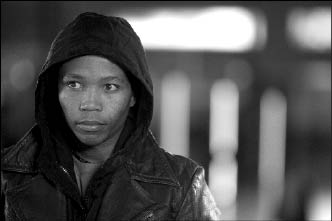Next story: PP&P: Land of Plenty
One Thug and a Baby: Tsotsi
by M. Faust

This year’s Oscar winner for Best Foreign Language Film, and probably the first film to be shot in the language of Tsotsi-Taal, Tsotsi is a story from a place that must certainly be teeming with them—the endless shantytowns that surround the city of Johannesburg, South Africa, with a collective population of 10 million people.
Based on a novel written in 1960 by playwright Athol Fugard, the story was updated to the present day in order to avoid the budgetary problem of having to recreate the costumes and locations of 50 years ago. The change barely matters, though, because the possibilities of the setting, rich in either time period, are reduced to background for a vivid but conventional morality tale.
The title means “thug,” and is the only name by which the film’s 19-year-old protagonist (played by Presley Chweneyagae) is known. He is the leader-by-default of a gang of four that spends its nights terrorizing the outskirts of the city. Though they rob and beat at will, a subway crime we witness is the first time they have committed murder. Crossing that line bothers one of the gang’s members, but his attempt to appeal to the decency of Tsotsi only gets him a ferocious beating.
We learn that Tsotsi has a bad past, one he chooses to repress. His outburst of temper comes from a remark that pierced that shell, one that causes him to head out looking for more mayhem. What he finds instead, at the end of a night of violence, is—a baby.
How Tsotsi acquires the infant is not believable, but that’s what the story is going to be about and therefore it is engineered. Nor is it plausible that he holds onto it, unless we read a great deal into his mind, more than we really have any basis for. The important thing is for us to recognize that no one who will care for a helpless infant can be truly bad.
That’s a banal statement, and at heart Tsotsi is a fairly banal movie. It is strongest in its depiction of the shantytown life—the impossibly cramped shacks built literally on top of each other, the orange haze that passes for air, the propulsive kwaito music, the seedy illegal bars that offer nothing aside from alcohol. We may be accused of gawking at the misery of other people, but seeing how people in such places live is an important function of movies: how else would we know?
Tsotsi’s humanization increases as he comes to know a local woman, a little older than himself, who is raising a baby of her own. (It’s possible that her husband was killed by Tsotsi and his droogs.) Though he approaches her for help in feeding the baby the only way he knows how—at gunpoint—he sees both tenderness and beauty in her life, and begins to sense that his own life might be lived in a different way.
But of course real life is hard, and this film that wants us to go gooey at the sight of a gurgling baby is also more than happy to rub our noses in pain. A flashback to Tsotsi’s childhood almost caused me to walk out of the theater. (The scene involves a dog, and I’m sure that the filmmakers did not mistreat or hurt it, but if you have any affection for animals you may want to step out of the theater for a minute or two when Tsotsi’s memories kick in. The event is even foreshadowed by some earlier dialogue.)
Director Gavin Hood, who previously directed a dreary Polish film, In Desert and Wilderness, that played in Buffalo a few years ago, wanted to soften Fugard’s ending to leave the film with a feeling of hope. I’m mystified as to how he feels his ending accomplishes this. Without giving anything away, let me say that Tsotsi’s fate after the final shot of the film is both inevitable and painful to contemplate, given that we’ve grown to sympathize with the boy. (Never truly convincing as a hardened thug, baby-faced actor Chweneyagae seems to have more in common with his crawling companion than his co-criminals.) If a movie is going to make me feel bad, it would be nice if it at least had a point to it.
|
Issue Navigation> Issue Index > v5n15: Tom Golisano on the Buffalo Creek Casino (4/13/06) > Film Reviews > One Thug and a Baby: Tsotsi This Week's Issue • Artvoice Daily • Artvoice TV • Events Calendar • Classifieds |









 Current Issue
Current Issue